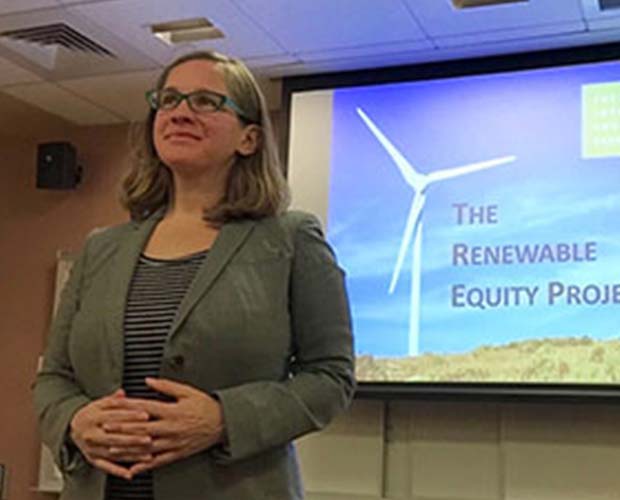Fletcher Researcher Honored for Work in Closing Clean Energy Industry's Gender Gap
The Fletcher School of Law and Diplomacy at Tufts University announced that Rebecca Pearl-Martinez received the Advocacy Award on May 31, 2016 from the Clean Energy Education & Empowerment (C3E) initiative of the U.S. Department of Energy, MIT and Stanford University. This award is highly competitive and its recipients represent the pinnacle of a group of qualified leaders in the energy field.
“Rebecca has taken on the challenge to prove the importance of women in the clean energy field, and this award highlights the necessity of her research,” said James Stavridis, Dean of The Fletcher School. “We’re thrilled that this innovative and groundbreaking work will take place at The Fletcher School."
Pearl-Martinez's newest research aims to prove the economic and social benefits of closing the industry's gender gap. Knowing that including women makes smart economic sense, participation by women in the energy workforce could accelerate the clean energy economy. Through research, education and advocacy, the project intends to build awareness and inspire change in the energy industry.
“This award signals that gender diversity in the clean energy workforce is important, and we see it as the next innovation to accelerate the energy transition,” said Pearl-Martinez. “Faced with a threat to our planet and our humanity as great as climate change, we need all hands on deck.”
Coming off of the historic Paris Climate Change agreements, the energy industry is ripe for change. Worldwide, women’s employment in the clean energy industry has been estimated globally at only 33 percent, and in industrialized countries: only 20-25 percent, with the majority of these women holding administrative or marketing positions. In the U.S., women account for only about 37,500 solar workers, or just over 21 percent of the workforce – even less are employed in solar installation. Women’s employment in infrastructure and construction trades is further limited, with estimates ranging from a mere 2- 9 percent in the U.S., and women of color facing additional imbalances in these trades. Looking at senior leadership, around 61 percent of US energy companies have no female representation on their Board of Directors.
“The research we are doing is innovative and timely because we are in the midst of an energy transition toward renewable technologies,” said Barbara Kates-Garnick, Professor of Practice at The Fletcher School and advisor to the Renewable Equity Project. “However, there is not enough known about the significant gender imbalances in the energy industry and how to fix them. Our research will bridge that gap.”
Pearl-Martinez is currently Research Fellow and Head of the Renewable Energy Project at Fletcher’s Center for International Environment and Resource Policy. She has dedicated her career to advocating for women’s advancement as a means toward sustainability, and is among a handful of individuals who introduced the topic of gender and climate change on the global policy stage. She has helped a myriad of international institutions address gender equality in their efforts on energy and climate change, including United Nations bodies, USAID, Power Africa, the World Bank’s Climate Investment Funds and Oxfam America. Her data-driven approach to gender advocacy garnered a nomination for the Katerva Award for sustainability innovations and led her to serve as the data specialist for the forthcoming Global Gender and Environment Outlook of United Nations Environment Programme, launched on Wednesday, May 25, 2016.

